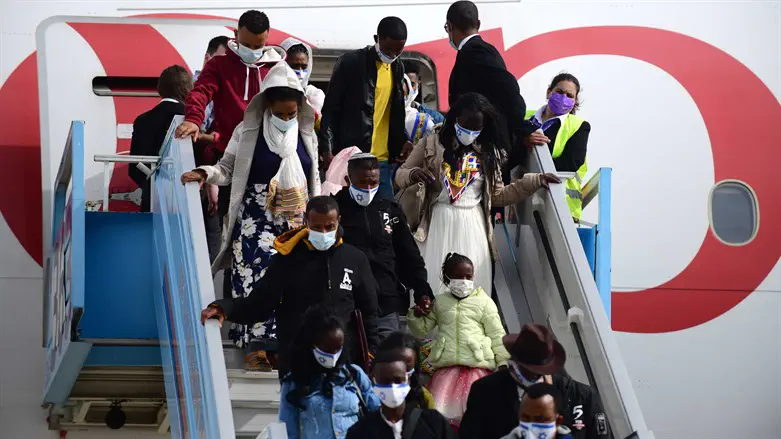
On Monday, the Israeli Immigration Policy Center intends to present a petition to the Supreme Court regarding the government’s plans to bring a further 3,000 Ethiopians from camps in Gondar and Addis Ababa to Israel. The Center’s attorney, Dr. Yonah Sherki, explained the petition and the reasons motivating it:
“In recent years, the government has made a number of decisions regarding bringing people with no clear link to Judaism from Ethiopia to Israel,” he said. “The idea behind this is to circumvent the Law of Return which applies only to Jews or their offspring. What we have learned is that this latest decision has no restriction on the number of people it applies to.
“Previous decisions,” Sherki explained, “applied to two or three thousand people, but now the government wants the new rules to apply to anyone who meets with three basic criteria: anyone who has a relative in Israel; anyone who has been in one of the camps since 2010; and anyone who wants to prove a family connection to a Jewish ancestor, whether via his father or his mother. Hundreds of thousands of people could potentially fulfill these criteria,” he noted.
When asked whether restricting entrance to Israel based on having been in a camp since 2010 is not a significant criterion, Sherki responded that the lists of people in the camps are compiled by private entities with no oversight, and that there is no reason to rely on them. “These lists are then presented to the Israeli government, and furthermore, they were only compiled four or five years after the cut-off date, and handed over the government in 2016.
“Just recently,” he added, “77 people immigrated to Israel with the aid of the IDF and the intervention of the Mossad – at a cost of 14 million shekels. Not long afterward, it emerged that these people had no connection to Judaism whatsoever – worse still, they are suspected of being war criminals. The Ethiopian Prime Minister had good reason to yell at Naftali Bennett for executing an operation on his soil that was designed to aid war criminals. This event was simply inexcusable. These people were brought here based on a list compiled by a private entity and the person who promoted the operation was the Minister of Immigration and Absorption, Penina Tamano-Shatta – this is the way things are done lately.”
According to Sherki, the current situation enables “the immigration to Israel of tens of thousands – or even hundreds of thousands – of people whose relationship to Judaism may not even exist. They certainly are not eligible for entry via the Law of Return. The question is whether the government has the authority to override the authority of the Israeli Knesset and establish its own criteria for making aliyah – criteria which are actually in opposition to those set down in the Law of Return. What we argue is that such decisions must be made by the entire Knesset, as these are broad questions of nationality – and that is why we are appealing to the Supreme Court, in the hope that it will annul this latest decision and order the government to reconsider this question in a professional manner, one that takes into consideration all the possible ramifications.
“At this point in time,” he stressed, “not a single government official knows exactly how many people could become eligible for immigration if this decision is implemented. In fact, it’s actually impossible to know the answer to this question because anyone can claim to have been in a camp since 2010 and so forth. The camps have actually already been emptied out a number of times, in the wake of previous government decisions, and they simply filled up again. But the decisions affecting the Ethiopian immigration are made far from public scrutiny – and for good reason, because if the public were to find out what is going on, there would be a huge outcry.”
Sherki stressed that the latest decision is supposed to be implemented “immediately – although for the time being, the government has yet to appoint an official to supervise it. However, preparations are already being made – and that’s why we have asked in our petition that a temporary stay be imposed, until the issue is thoroughly clarified.”